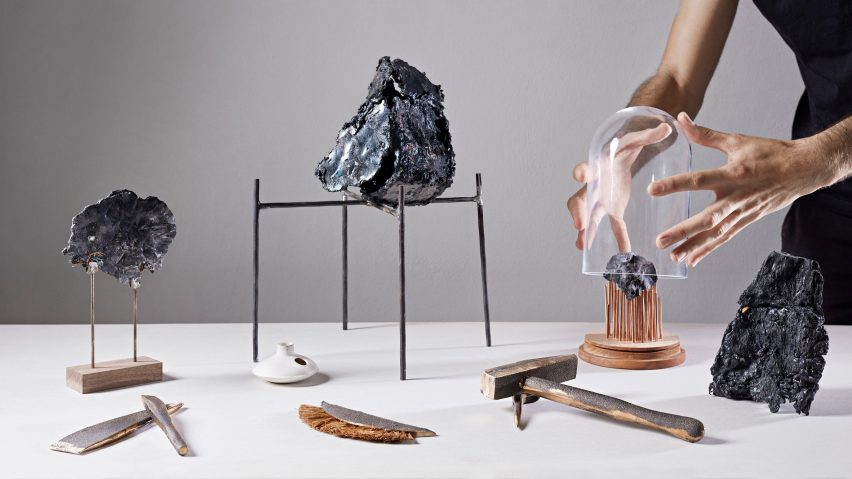Design Academy Eindhoven graduate Shahar Livne has created a clay-like material using discarded plastic that could be mined by future civilisations.
The Israeli designer is presenting a range of sculptural objects created from her Lithoplast material at Dutch Design Week.
Her aim is to challenge the idea that petroleum-based plastics are damaging the planet by treating their waste as a valuable commodity for future generations.
She speculates that plastic production will cease in the future. As a result, the discarded waste from the present era would be seen as a rare and natural resource, will need to be mined from deep underground.
"I imagined a future where plastic has become a nostalgic, valuable material that will be mined from ancient landfills," she told Dezeen.
Livne began by digging up waste plastic from beaches in the Netherlands and Israel. To create the Lithoplast material, she layered the plastic with minestone and marble dust – two by-products from the coal mining and stone masonry industries, which are usually discarded.
She then applied heat and pressure to mimic a natural geological process known as metamorphism. This process alters the composition of an existing rock, causing its form and texture to change.
The result is a malleable, clay-like material that can be pressed into shape by hand. It has a rocky, uneven surface, which Livne polished with a water jet to create a smooth finish.
Livne says that Lithoplast could become a naturally occurring substance within a few centuries if non-biodegradable plastic manages to permeate the Earth's crust. She claims this process has already begun.
"My research was based on what geologists expect will happen to plastic in the future," she told Dezeen. "We can already see plastic hybridising with nature, through the behaviour of animals using it, or through new rocks that are made out of plastics."
By challenging the common perception of plastic as a cheap commodity, Livne wants to start a discussion about the cultural value of materials and our planet's ability to adapt to a surplus of waste.
"If plastic is eventually used by craftsmen, its value will change," she told Dezeen. "People immediately think that plastic is a threat, but as a geologist told me – the Earth just doesn't give a damn."
"We always imagine doomsday scenarios, but I think plastic could be really beautiful. Maybe we’ll all die out, and there will be a new culture that says 'wow, what is this material?'"
Livne's project is currently on show at the Design Academy Eindhoven graduate show, which takes place until 29 October 2017 as part of this year's Dutch Design Week.
She is one of a growing number of designers exploring how human activity is shaping the geology of planet earth. This phenomenon has led some scientists to declare we are living in a new geological era called the anthropocene.
Also at Dutch Design Week, Dezeen hosted a series of talks looking at whether design can provide answers to the world's big problems, from terrorism to climate change. All of these talks are available to watch via our Good Design for a Bad World page.

